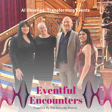Become a Creator today!Start creating today - Share your story with the world!
Start for free
00:00:00
00:00:01

Events Without Borders: Insights from South Africa and Mexico
Live from IMEX Frankfurt, Eventful Encounters gathered two global voices to explore how business events are being strategically embedded into national economic growth. Carlos Martinez (Mexico City Tourism Fund) and Glenton de Kock (South African Association for the Conference Industry - SAACI) [AB1] unpacked how infrastructure, policy alignment, and community engagement are turning events into long-term investments.
Transcript
00:00:00
Speaker
Hello and welcome to Eventful Encounters, the podcast that brings you insights from the heart of the global events industry. We're your hosts, Leanne and Tanita from the Eastside rooms. And today we're recording live from IMAX Frankfurt, capturing conversations that matter to the meetings and events community.
00:00:16
Speaker
Today we're delving into a critical topic, the role of business events in national economic growth and development. As the world continues to recover and redefine itself post pandemic, The strategic importance of business events in supporting broader economic goals has never been clearer.
00:00:32
Speaker
This session will explore how countries from around the globe are integrating business events into their long-term economic strategies, creating lasting value through policy alignment, strategic partnerships, and targeted investment.
00:00:44
Speaker
So before we dive into the discussion, please can we introduce our fantastic guests? So, Carlos, would you like to introduce yourself? Yes, I'm Carlos Martinez from a Mexico City Tourism Fund. And we we have the the Congress and Convention's office in Mexico City.
00:01:02
Speaker
And we are a government party to gather all the interest to make more Congress and conferences in Mexico City. Fabulous. And Glenton, would you like to introduce yourself as well, please?
00:01:15
Speaker
Good day to the listeners all the way from Frankfurt. I'm Glenton de Kock. I'm the CEO for the Southern African Association for the Conference Industry, private sector association body um that drives not only advocacy, policy, learning, as well as business growth for members and business event owners ah within the southern part of Africa.
00:01:35
Speaker
Thank you for joining us today, both of you. i know it's been a ah session already. But to start, we'd love to hear your thoughts on evolving role of business events and supporting national economic strategies. How do you see business events contributing to long term economic growth in your representative areas?
00:01:49
Speaker
Yeah, I think from my side, from South African perspective, particularly Africa as well, we've seen quite a lot of governments and destinations like Uganda, Mozambique, Angola, Namibia, South Africa, Kenya, Rwanda, identifying that through a meeting an event or through a business event, um you can drive tourism.
00:02:08
Speaker
And in most instances, a lot of times, many of us who delegates themselves go to a particular event particular event because of either content or the need to be there. So whether it's an investment conference, a health conference, you go to destinations that you might not necessarily have on your bucket list.
00:02:23
Speaker
Yeah, that happens to us. And in doing that, you by default then enjoy part of the tourism activities. Yeah, I loved how you talked about that in the session. 100%. So the core on that is, and always say this to my colleagues, as I said earlier in the session, is while I don't do tourism,
00:02:38
Speaker
I can help tourism grow across the board. And in doing that within the content of the program, ensuring that your activities after hours, even the cuisine that has sort of been tasted or provided to the delegates, represents what comes from that particular area, whether at a national or a regional level as well.
00:02:55
Speaker
Yeah, I love that concept. And Carlos, what's the situation over in Mexico? We have now, ah ah we we set a goal to increase tourism by 30% 2030. I know we had that in the session. That was, yeah. Six million people, six million more people. That's a lot of people. That that than that that we received in 2024. So we are trying to work very hard with three strategies. The first one is infrastructure. The second one is promotion.
00:03:24
Speaker
And the third one is Congress and and conventions in Mexico City. so it's ah It's a key part of the increased tourism, as as Clinton said, but also to boost our economy because the economy in Mexico City, tourism represents like 10% of Mexico City GDP.
00:03:46
Speaker
So it's very important to us to improve our tourism sector with infrastructure and congress and conferences. And how do you think the FIFA World Cup will affect that?
00:03:58
Speaker
Well FIFA World Cup will be ah ah challenging for for a city perspective. We are investing like 200 million dollars in new mobility infrastructure.
00:04:12
Speaker
But we expect in the term terms of economic return from the from the days of the matches and so on, like 500 million dollars. Which massive. Yes, in spending it around the city. so it's ah It's a good investment to to Mexico City to bring the World Cup for the third time. And Mexico City is the first city in the world that actually hosts for a third time a FIFA World Cup inauguration.
00:04:41
Speaker
Wow, really? I didn't know that. No, me neither. But like you said, it's the infrastructure then that you're building as part of having that event into the city that will then give you the and the infrastructure for long-term growth as well, won't it? So it's not just that one event, it's driving your future business into the city then. Because we are improving our... Yes. Because airports. Yeah, I've heard that. That is for the future as well.
00:05:06
Speaker
And we are improving our mobility system and mass transportation system in Mexico City. Fabulous, sounds like there's lots happening. So can each of you share a standout example of a successful initiative that's directly contributed to economic growth through business events in your region? and So looking back at business events now specifically, you know can you think of some good examples that you can share of our listeners?
00:05:30
Speaker
I think that it's about the infrastructure development. yeah So um two, two so maybe probably three. So Cape Town International Convention Center, the locality of the convention center with the added advantage that they have in terms of accommodation establishments linked across the road from the Vienna waterfront that has now got a cruise terminal to it as well. So yeah so as an economic precinct, you can actually see tourism happen, yeah but you can actually see delegates mingling with tourists. And then you've got then you've got all of the cruise liners that are coming in because it's in season right now. And you can then see the ecosystem work.
00:06:08
Speaker
um you know You can probably see five or seven segments of whatever the economic system would be around tourism or eventing eventing as well. And then the subsectors around creative economies, restaurants, um ah activities going forward as well.
00:06:22
Speaker
The second one will probably be just further down the line, which is Stellenbosch, which is predominantly a wine part of South Africa. Yes, wine. We wine. what, three years ago we had our national conference there and if you spoke to them about business events or meeting and event and that.
00:06:38
Speaker
I don't remember when we had said, listen, we're going to come and take our event there. They went like, man, we do wine here. We don't do sort of this meeting and event thing. But from hosting that and demonstrating the economic value, yeah yeah the university, Stellenbosch University, put together their own um events and conference bureaus right now. So they employ 11 people.
00:07:00
Speaker
um You'll see them on the IKA ranking, so you'll see how they've been boosting the economy there. And the third leg to that now is they've got what's called the Winans Airport. Yeah, so literally, call it the equivalent of doing a Gatwick versus Heathrow because they've got Cape Town International Airport. So sex you doing this is an alternative to that as well because of the growth in the area there. um So it's it's ah it's a weird evolution, but probably one of the better case studies in demonstrating that if you diversify, yeah you can... outside the
00:07:33
Speaker
Yeah, and you can see what the opportunities lie there now because if you had gone, let's say, an airport, everybody go, why? Because you're doing wine, who wants to fly? Yeah. Case in point now is because you you've expanded your economic base, the airport makes sense for everybody.
00:07:48
Speaker
Yeah, course. And you've got the support of the wine farmers and all of those logistic partners around that, and there's no debate as to like when. It's a case of we it's going to happen type of thing.
00:07:59
Speaker
That's great. That's a great example. And how about you, Carlos? Can you think of some examples where business events have really boosted the economy for you? Well, I think Mexico City is a big city, but it's smaller compared to San Francisco.
00:08:18
Speaker
But actually, in Mexico City, 60% of the land is a forest. 60% of Mexico City is a forest. And you have urban hiking and something like that in Mexico City. I would like this. don't even have Mexico City down.
00:08:38
Speaker
Of course. Nobody. he does might call us because Because everybody, if you you like coming to Mexico City from a plane, you can see a sea of lights.
00:08:50
Speaker
yeah Mexico City is a 20 million city, but actually 60% is forest. us So we are working with the conventions.
00:09:00
Speaker
The convention centers are a private. owner but we have three large convention centers in Mexico City. And we are working with them for two things. For conventionists or the people to come to the convention, go in the weekend to a hiking, urban hiking in Mexico City. yeah And to know all the traditions around it all the forest in Mexico City. We have little towns that you can imagine that you are in Mexico City because it's a really small colonial town
00:09:32
Speaker
in the south of Mexico City, and you can imagine that you are in Mexico City and you can know all the traditions and all the ancient culture of Mexico City. and that's And that's part of the of the economy of that a of that places in Mexico City because they share they their their their traditions and all that stuff. So so we are we are working together with with the convention centers.
00:10:00
Speaker
to make people see the city differently and all that it has to offer. And also, like you said, it enhances people to, it encourages people to stay longer, doesn't it? Like, yeah, and add on extrarifu and leisure. Exactly.
00:10:12
Speaker
Would love to be up to do. Yeah. but So looking ahead, what key trends and challenges do you foresee in integrating business events into the national economic planning? I think first is about the regional spread. And also, as I said earlier, the the amount of destinations on the continent, you know, that have seen the value, which means that obviously there's a potential co-competitiveness that will happen within Africa.
00:10:37
Speaker
Yeah, of course. And while it's good to have, it could also be a deterrent. So our message in this very simplistic is that the event has to come to Africa. where it's hosted is is a debate after that. It's all about collaboration. after regard So we've got a key role to play because like ourselves from a South African perspective, um we've built the frameworks and a lot of what we do in terms of collaborating at ah at an industry level is to ensure that industry organizes themselves across the continent as well.
00:11:10
Speaker
um And that at a local level, there's an understanding that you need to know where to pitch for an event yeah so many many times destinations want to have let's say 5 000 delegates with a trade or a conference and they don't have a venue for that no right or as i said earlier they have a venue for it but they don't have supplies behind it yeah yeah and then you've got a you've got a local issue where we have to sort of parachute other supplies in and then you have a look you've got these issues issues that look so we say and listen let us be clear about are we going to hunt we we mean didn want what we're bidding for as well. And this is courtesy, let's tell each other that we're bidding for something. Yeah, yeah exactly. we together We're together, not against each other. I think from ah from a trends perspective, ours is far more better alignment, better hunting together in terms of where we can convert.
00:11:57
Speaker
And then also ensuring that at a at a real sort of almost at a small town and village area that there's clarity for purpose for the local community as well. you know And many times when we speak local community in our context, I'm i'm always mindful and telling my my members and my colleagues that the local community starts with the hotel staff.
00:12:17
Speaker
you know starts with a conference or banquet and stuff because they come from the local community. yeah right So if you if you're thinking of, and I think sometimes we have this sort of picture in our mind that goes, the community is outside of where the event is happening versus inside the event. And and our approach has been a little bit different to say, listen,
00:12:36
Speaker
make sure that staff are aware why you are coming. yeah um And in addition to that is if they're aware that, let's say IMAX is happening for instance, um they can go, they can actually engage with you.
00:12:47
Speaker
And to a large extent, what but but I found through through our work is if staff are more informed, you actually pick up more nuances and context as well. And that could also inform how people perceive the destination.
00:12:59
Speaker
Yeah, absolutely. Because then we feel like everybody's engaged in the community and everybody knows what's going on and wants to be there. Yeah, we are. 100%. And understanding the value of having that event in their city or their region.
00:13:12
Speaker
Great answer. Thank you. We are aligned with federal government. In Mexico City, we we work together with the federal government.
00:13:26
Speaker
ah A good start, yeah. Yes. In federal level, the president, Ms. Claudia Sheinbaum, Ms. Claudia Sheinbaum, put one goal. It's like to become the fifth most visited country in the world. Wow.
00:13:43
Speaker
You've got big ambitious goals. like it. Yes, big ambitious goals. So in Mexico City, we said like we can to put in that the goal, to achieve that goal,
00:13:54
Speaker
we put like 25% of the gold it's for Mexico City. So we are working commit we are working together in ah in ah in a document that's called Plan Mexico.
00:14:07
Speaker
It's a document that that put together the economic development, regional economic development and different strategies from tourism to industrial development and something like that.
00:14:18
Speaker
And that one document, so we are working together between the states of Mexico with the federal government. We are aligning all the policies and we are working now in a national conference bureau that doesn't exist now in mexico in in Mexico as a country, but we are working together, all the 32 states in Mexico mexico yeah to to put nationally together a national So we are we we will be a a very important hope for conferences in North America and from Latin America as well.
00:14:55
Speaker
watch the space, Mexico is definitely up and coming. but Well, thank you both for your incredible insights. I think it's been really good to kind of listen to you. We enjoyed listening to your session, but actually having you here now, I feel like we've got a little bit more in depth. Yeah, and definitely. The key theme that keeps coming up is collaboration, isn't it? Collaboration is so important to drive events.
00:15:17
Speaker
um So at these sad rooms, we're also passionate about being a strategic partner for these kinds of forward thinking initiatives. So thank you for to both of you for joining us today. do you have any closing remarks that you'd like to add?
00:15:31
Speaker
I think the the the critical one for me is that you need to ensure that when you do what we do, that sustainability is at the forefront. yeah And as much as sustainability, and um I know my colleagues back home ah don't enjoy me always saying this, but it's also ah also about human sustainability as well.
00:15:48
Speaker
yeah we We work in an industry that's fast-paced, long hours. so that I always say that if if if we don't look after ourselves as humans, we can't look after the environment. That's as simple as it. Life work. I liked that statement. Can you that up? I think the other thing, you said that it's collaboration between government and private sector.
00:16:18
Speaker
It's a key to become a better place, to have conferences and conventions in any city. Well, thank you. Thank you for joining us. And as ever, stay up to date with all things and Eventful Encounters.
00:16:31
Speaker
Follow us on Instagram, LinkedIn, and the other platform that we're on, which is Facebook.
00:16:38
Speaker
Thank you. Thank you, Gwent. And thank you, Carlos. Take care.
















